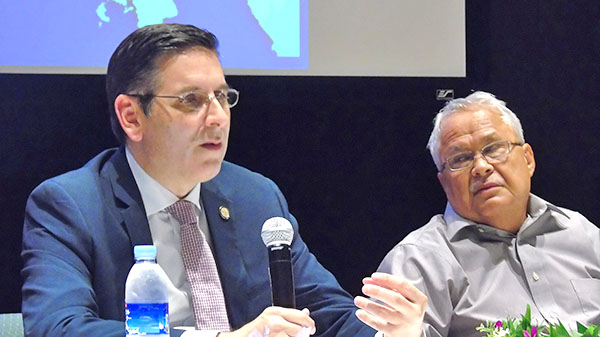‘Statehood, independence only way to avoid constitution being trampled’

U.S. District Court in Puerto Rico Chief Judge Gustavo A. Gelpi stresses a point as retired CNMI Chief Justice Jose S. Dela Cruz listens during his presentation on U.S. constitutional rights in the territories and the CNMI at the American Memorial Park visitors center theater Friday night. (Ferdie De La Torre)
U.S. District Court in Puerto Rico Chief Judge Gustavo A. Gelpi stated that the only way to avoid having the CNMI Constitution being trampled by U.S. Congress is for the CNMI to either become a state or get its independence.
Gelpi also cited that if a citizen from Hawaii or California marries somebody in Japan and does not want to come back to the U.S., he can still continue to vote in the U.S. presidential election and that individual never lost his right to vote.
The judge, however, questioned why he, who is from Puerto Rico, or a CNMI resident should not be able to vote for the nation’s leader.
“This may require constitutional amendment. There is no easy solution,” Gelpi said.
Gelpi discussed U.S. constitutional rights in the territories and the CNMI during a presentation Friday night at the American Memorial Park visitors center theater in Garapan.
The presentation was made possible by funding from the National Endowment for the Humanities, through a grant award from the Northern Marianas Humanities Council.
Gelpi said the CNMI, Puerto Rico, and other territories don’t have representation whenever the U.S. president makes important decisions.
Gelpi said an example is when U.S. Congress declares war.
“We don’t get to vote. We don’t have to say absolutely. But if there is war, we are all under obligation to enlist for military duty or work on national importance,” he said.
The judge said it’s ironic that the people of the CNMI and other U.S. territories do their obligation but have no vote on those decisions.
He also pointed out that when it comes to serving in the military, the territories have the highest per capita enlistment in the entire nation.
Gelpi said the CNMI reached a commonwealth agreement with the U.S., which is very similar to what was reached in Puerto Rico in 1952.
“Here you call it the covenant. In Puerto Rico, the constitution was written in the nature of a compact. Very similar,” he said.
Gelpi said in a sense it is a bilateral relationship, but really it is the U.S. that has more power.



























